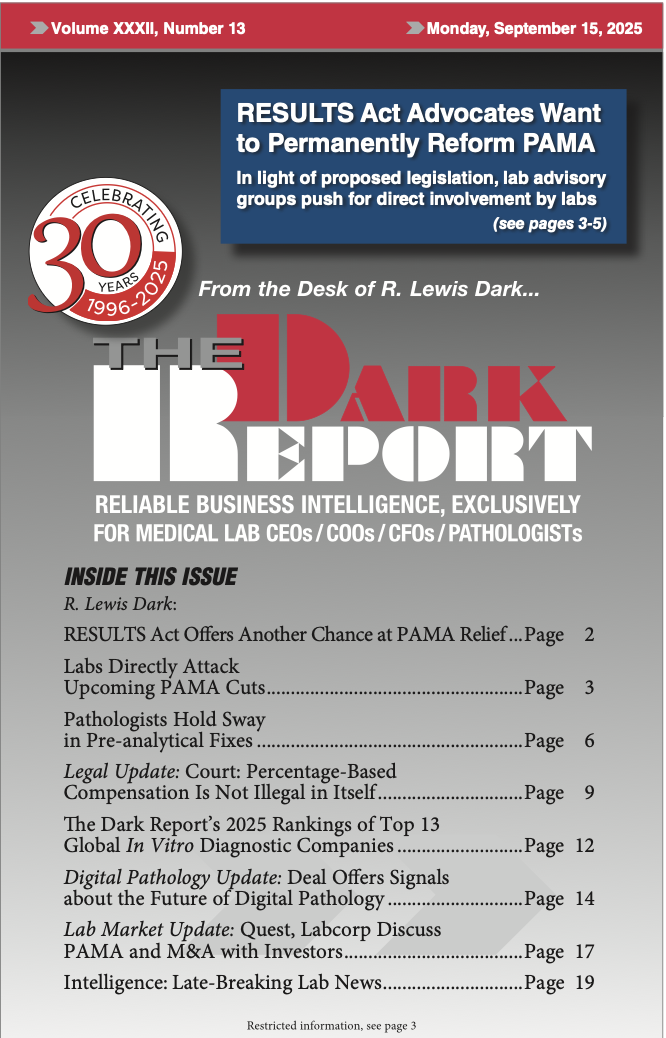Robert Michel
 Until Robert L. Michel came along and founded The Dark Intelligence Group (DIG) two decades ago, the clinical laboratory industry and the anatomic pathology profession lacked a trustworthy source for information about the management and operations of medical laboratories. From its inception in 1995, The Dark Report quickly became the “go to” source of industry intelligence, innovations in lab management, and strategic market analysis.
Until Robert L. Michel came along and founded The Dark Intelligence Group (DIG) two decades ago, the clinical laboratory industry and the anatomic pathology profession lacked a trustworthy source for information about the management and operations of medical laboratories. From its inception in 1995, The Dark Report quickly became the “go to” source of industry intelligence, innovations in lab management, and strategic market analysis.
This excellence in reporting has earned recognition from his peers. For example, twice Michel and The Dark Report have won national awards for best investigative reporting by the Specialty Information Publishers Association. In 2005, the award was for Michel’s coverage about how the anatomic pathology condominium laboratories (pod labs) operated by urologists and gastroenterologists came to be, who operated them, and how these owners marketed the AP condo labs to other physician groups. In 2009, Michel’s award for best investigative reporting resulted from his published interviews with Quest Diagnostics Incorporated when the company admitted that, for a period of 18 months, it had been reported inaccurate Vitamin 25(OH) D results because of problems with its laboratory-developed test methodology. The Dark Report’s story was picked up by The New York Times and was in the national news cycle for several days.
In his role as Editor-in-Chief, Michel brought unique capabilities to DIG and The Dark Report. His management training and diverse business experience—along with his skills as a concise writer and analyst—proved to be a winning combination for readers of The Dark Report. For that reason, Michel’s story has many intriguing elements.
Immediately prior to founding DIG, he had served in several executive positions for Nichols Institute based in Portland, Oregon, and San Juan Capistrano, California. This was during the time that Nichols Institute was an independent public lab company with annual revenues of about $280 million (prior to its acquisition by MetPath, Inc., now Quest Diagnostics Incorporated). He traveled extensively to many of the clinical lab business units owned by Nichols Institute in different regions of the United States and played a role in formulating effective market strategies in response to the emergence of closed-panel HMOs, capitated pricing, and full-risk managed care contracts, among other successful management initiatives.
Prior to his service at Nichols Institute, Michel served at three different Fortune 100 companies. These were Procter & Gamble, Centex Corporation, and Financial Corp. of America. Each was an opportunity to master new management techniques and apply them in different industries. Between these positions, he gained experience as an entrepreneur, having founded a real estate development firm and a general contracting company in the Southeastern United States.
Robert Michel earned a Bachelor of Arts degree in Economics at the University of California, Los Angeles, where he played rugby, a sport he participated in for another 22 years. He is a native of California and grew up in Santa Ana.
Articles by Robert Michel
October 17, 2016 Intelligence: Late Breaking Lab News
From the Volume XXIII No. 14 – October 17, 2016 Issue
Quebec’s provincial health authority is moving forward with what may be one of the largest consolidations of clinical laboratory testing undertaken in North America during the past 30 years. The goal is to bring the lab testing currently done in as many as 500 locations throughout the province int…
UnitedHealthcare to Bring BeaconLBS to Texas
From the Volume XXIII No. 14 – October 17, 2016 Issue
CEO SUMMARY: With a quiet announcement this month that it was bringing its laboratory benefit management program to Texas on March 1, 2017, UnitedHealthcare is taking on a big challenge. Enrollment in UHC’s commercial plans in Texas is 4.3 million. That is twice the two million commerci…
FDA Official Outlines Need for Federal Regulation of LDTs
From the Volume XXIII No. 14 – October 17, 2016 Issue
AT A CONGRESSIONAL BRIEFING LAST WEEK, a federal official charged with regulating laboratory-developed tests made the case that LDTs are inconsistently reliable and thus put patients at risk, according to MedPage Today. “If you take the same patient sample and you send it to different la…
Can Clinical Laboratories Adjust To ‘New’ Healthcare System?
From the Volume XXIII No. 14 – October 17, 2016 Issue
CEO SUMMARY: Month by month, there is increased clarity in the path the American healthcare system will follow as hospitals, health systems, and physicians integrate clinical care, manage populations, and practice personalized and precision medicine. While these changes play out, clinical…
Attorney Jane Pine Wood to Be Chief Legal Counsel at Bio-Reference
From the Volume XXIII No. 13 – September 26, 2016 Issue
One of the most widely-respected and trusted attorneys serving the clinical laboratory industry and anatomic pathology profession is leaving private practice to join the corporate world. …
September 26, 2016 Intelligence: Late Breaking Lab News
From the Volume XXIII No. 13 – September 26, 2016 Issue
Molecular and genetic testing laboratories that use the Microsoft Excel software program for some of their homegrown informatics may be at risk of lab testing errors due to an auto-correct quirk in the Exel software. Modern Healthcare reported on how researchers in Australia looked at 3,600…
Cepheid, Sequenom Acquisitions Further Consolidate Lab Testing
From the Volume XXIII No. 13 – September 26, 2016 Issue
TWO ACQUISITIONS FURTHER consolidated the clinical laboratory testing industry in recent weeks. The acquired companies were Sequenom and Cepheid. Sequenom went first. On July 27, Laboratory Corporation of America announced an agreement to acquire …
Alert to All Labs: Beware Of ‘Reference Pricing’
From the Volume XXIII No. 12 – September 6, 2016 Issue
CEO SUMMARY: “Reference pricing” does not refer to how a lab negotiates prices with its reference lab! Rather, reference pricing describes a specific approach to health plan benefits that incentivizes the consumer to choose lower-cost providers while allowing that consumer to still us…
September 6, 2016 Intelligence: Late Breaking Lab News
From the Volume XXIII No. 12 – September 6, 2016 Issue
During the widespread floods in Louisiana last month, Pathology Group of Louisiana (PGL) activated its disaster preparedness plan and managed to avoid any interruption of its pathology services. One vital element of that plan was a telephone tree that kept managers and staff in commu…
Reference Pricing’s New Lab Winners and Losers
From the Volume XXIII No. 12 – September 6, 2016 Issue
CEO SUMMARY: Expanded use of reference pricing by employers in coming years could trigger a cycle of cuts to lab test prices that would put the most pressure on the lab companies with the highest prices. Many hospital labs are viewed as having high prices. But because they run outreach sp…
CURRENT ISSUE

Volume XXXII, No. 13 – September 15, 2025
The Dark Report examines a new bill that would reform PAMA and avoid reimbursement rate cuts scheduled for January 2026. Clinical laboratory leaders are urged to make their voices heard in Congress. Also, an expert describes how labs can fix pre-analytical errors and avoid disaster.
See the full table of contentsHow Much Laboratory Business Intelligence Have You Missed?
Lab leaders rely on THE DARK REPORT for actionable intelligence on important developments in the business of laboratory testing. Maximize the money you make-and the money you keep! Best of all, it is released every three weeks!
Sign up for TDR Insider
Join the Dark Intelligence Group FREE and get TDR Insider FREE!
Never miss a single update on the issues that matter to you and your business.
Topics
- Anatomic Pathology
- Clinical Chemistry
- Clinical Laboratory
- Clinical Laboratory Trends
- Digital Pathology
- Genetic Testing
- In Vitro Diagnostics
- IVD/Lab Informatics
- Lab Intelligence
- Lab Marketplace
- Lab Risk & Compliance
- Laboratory Automation
- Laboratory Billing
- Laboratory Compliance
- Laboratory Equipment
- Laboratory Information Systems
- Laboratory Management
- Lean Six Sigma
- Managed Care Contracts
- Molecular Diagnostics
- Pathology Trends
- People
- Uncategorized

